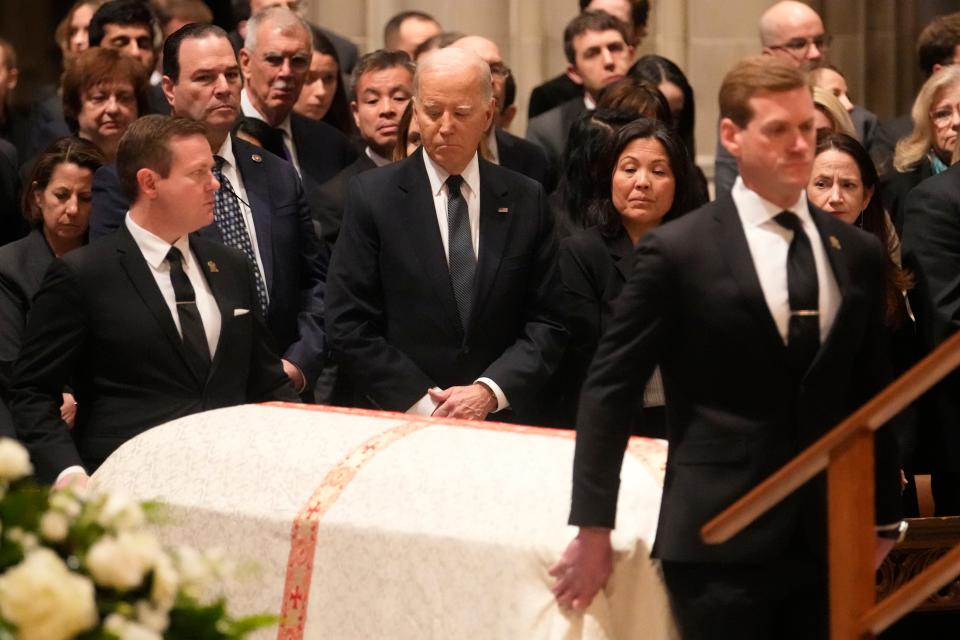'American pioneer': President Joe Biden remembers legacy of Sandra Day O'Connor
WASHINGTON ? Sandra Day O'Connor, the gritty ranch girl who became the first female Supreme Court justice and one of the nation's most powerful women, was remembered during a funeral service Tuesday as a "pioneer" and pragmatic jurist who shaped the law always with an eye toward the court's enormous impact on Americans.
Nominated by President Ronald Reagan in 1981, O'Connor would become one of the court's most influential justices, able to find middle ground in intractable legal issues such as abortion and civil rights during nearly 25 years on the bench. O'Connor died at 93 on Dec. 1 of complications related to dementia and a respiratory illness.
"One need not agree with all her decisions in order to recognize that her principles were deeply held and of the highest order and that her desire for civility was genuine," President Joe Biden said during the services at the Washington National Cathedral as he recalled O'Connor's testimony when she was a nominee and he served as the top Democrat on the Senate Judiciary Committee.
The service brought O’Connor back to the church she attended for years as a Supreme Court justice, a place where Washington often remembers former presidents, lawmakers and others who shaped the nation.
Biden: Sandra Day O'Connor was the first woman justice. Biden wanted her to own it
With the other eight members of the Supreme Court seated before him, Chief Justice John Roberts joked that the high court was like family "composed entirely of in-laws." O'Connor, he said, cut through the internal tensions with an approach that was simple and direct that he described as, "get it done."
O'Connor "was so successful that the barriers she broke down are almost unthinkable today," Roberts said.
When Evan Thomas, O'Connor's official biographer, recalled her efforts to cajole Justice Clarence Thomas to attend the court's weekly lunch meetings ? part of an effort to improve camaraderie on the court at the time ? Justice Thomas looked downward.
"She loved the law and the Supreme Court. She loved our country and our democracy," Jay O'Connor, one of the justice's three sons said. "Most of all, she loved her family."
"What do we say to this special person, this little cowgirl, this remarkable woman from a remote cattle ranch in Arizona, this mother, this justice, who did so much for so many people?" O'Connor said of his mother. "We say to her, 'We thank you. We love you. We will never ever forget you."
As he stepped down from the dais after his eulogy, O'Connor gave a loving touch to his mother's casket.
O'Connor's legacy honored
O'Connor served on the Supreme Court from 1981 until 2006.
Hundreds paid their respects to her on Monday as she lay in repose at the Supreme Court with dozens of her former staffers, clerks and current justices on hand.
O'Connor joined the court after an already notable career that included serving as the majority leader in Arizona’s state Senate – the first woman to hold that title in the nation.
She would become a key figure in landmark Supreme Court cases dealing with abortion, affirmative action and civil rights. O’Connor retired in 2006 and announced in 2018 that she had been diagnosed with dementia and would withdraw from public life.
Barbara Barrett, an Arizona resident who headed the Air Force and was ambassador to Finland, met O’Connor as an intern at the Arizona Senate, where O’Connor served as majority leader for the Republicans in 1972 in another historic breakthrough for women.
“The biggest privilege was watching her in action. It wasn’t the pay. It wasn’t the credit hours. It wasn’t learning the civics of the Legislature,” Barrett said.

“It was watching a true leader get the work done, and as she said, work worth doing. I got to see a woman do these things that women just weren’t doing and weren’t expected to do.”
'Role model for women'
Caroline Brown, a Washington lawyer who clerked for O’Connor during the 1991-92 term, was similarly awestruck. She said it’s easy today to forget what a role model O’Connor was.
“It’s hard to describe as a young woman in the ’80s how limited women seemed to be in public life and how Justice O’Connor was not limited,” Brown said. “She was fully herself in that position and such a role model for women of my generation. She was not just doing her job, she was very publicly a mother, very publicly a wife, very publicly a social person, an athlete.
“When she had breast cancer, she said the word breast in public. That was all very fresh and quite remarkable and hard to describe how new that was at that time.”
Brown’s year with the court included O’Connor’s landmark ruling that affirmed federal abortion rights. It was a splintered decision that remained secret until near the end of the term, she said.
The current court overturned that ruling last year and effectively unwound another pillar of O'Connor's judicial legacy in a case involving affirmative action earlier this year.

“I’m not sure that her legacy is as fully appreciated as it should be,” Brown said. “It’s hard.” In her later years, O’Connor ensured the children of her former clerks received “grandclerk” shirts.
Brown said the twin columns of her clerks stretching from the top of the court’s marble stairs to the plaza near the street on Monday was an impressive and emotional reminder of the power and durability of her bond with her staff.
Biden on Tuesday suggested that bond extended far wider.
"Gracious and wise, civil and principled, Sandra Day O'Connor, daughter (of) the American West, was a pioneer in her own right, breaking down the barriers in legal and political worlds." Biden said. "To her, the Supreme Court was bedrock, the bedrock of America."
This article originally appeared on Arizona Republic: President Joe Biden honors legacy of Justice Sandra Day O'Connor
